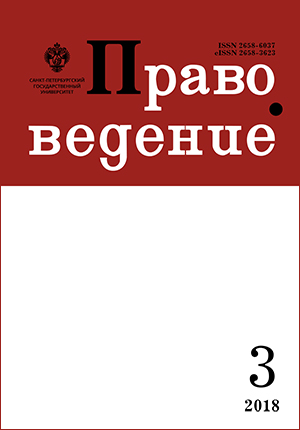Constitutional-legal status of unincorporated territories of the United States
DOI:
https://doi.org/10.21638/spbu25.2018.304Abstract
This article is dedicated to constitutional-legal status of unincorporated organized and unorganized territories of the United States. In the light of the provisions constitutional-legal status of the unorganized territory of Samoa illustrates the absence of clear demarcation lines between the institutional forms of organized and unorganized territories. Also drawn attention to the fact that unincorporated territories are in a unique legal position — they belong to the United States, but they are not part of this state. Indicates the methods used to integrate the unincorporated territories into the United States. It is indicated that the generalizing features of the constitutional-legal status of the unincorporated territories of the United States are the fragmentary application to them of the provisions of the national Constitution and the limited scope and resources for participation in shaping and implementing decisions made at the national level. Attention is focused on a discriminatory approach on the part of the United States with respect to the political rights of citizens living in unincorporated territories. The point is that the population of these territories is not entitled to participate in the election of Congress and the President of the United States and only some territories (USA Virgin Islands, American Samoa, Guam, Northern Mariana Islands, Puerto Rico) delegate their representatives to the House of Representatives. In the conclusion is formulated that such an approach does not comply with international legal standards of human rights, including those signed by the United States Universal Declaration of Human Rights of 1948, the International Covenant on Civil and Political Rights of 1966. It is emphasized that the scope of competence of some unincorporated territories may be broader than that of the states. Also within the framework of this article, the constitutional legal parameters of legislative, executive and judicial authorities of the unincorporated territories of the United States are considered. Attention is focused on the role and importance of federal authorities in determining and modifying the constitutional-legal status of unincorporated territories. It was concluded that diversified models of unincorporated organized and unorganized territories are peculiar indicators of the complex asymmetric structure of the USA.
Keywords:
Constitution, United States, unincorporated territories, organized, unorganized, organic act, status, competence, guarantees
Downloads
References
Aleinikoff, Alexander. 1994. Puerto Rico and the Constitution: Conundrums and Prospects. Constitutional Commentary 11: 15–43.
Bhagwan, Vishnoo, Bhushan, Vidya. 2018. World Constitutions — A Comparative Study. New Delhi, Sterling Publshers Pvt. Ltd.
Blocher, Joseph, and Gulati, Mitu. 2008. Puerto Rico and the Right of Accession. Yale Journal of International Law 43: 229–271.
Branch, James. 1979. The Constitution of the Northern Mariana Islands: Does a Different Cultural Setting Justify Different Constitutional Standards? LLM Thesis and Essays, paper 73. Athens, Georgia. Аccessed January 26, 2018. http://digitalcommons.law.uga.edu/stu_llm/73.
Dwyer C. Puerto Rico Overwhelmingly Votes On U. S. Statehood In Nonbinding Referendum. National Public Radio. 2017. June 11. Аccessed February 7, 2019. https://npr.org/sections/thetwoway/2017/06/11/532482957/puerto-rico-votes-on-statehood-though-congress-will-makefinal-call.
Greszler, Rachel. 2016. Congress Should Not Give Puerto Rico Federal Tax Subsides. Аccessed January 26, 2018. http://www.report.heritage.org/ib4523.
Lapidoth, Ruth. 1996. Autonomy: Flexible Solutions to Ethnic Conflicts. Washington, D. C., United States Institute of Peace Press.
Leibowitz, Arnold. 1989. Defining Status: A Comprehensive Analysis of United States Territorial Relations. Dordrecht, Kluwer Law International.
Lemongello, Steven. 2018. Trump an ‘absolute no’ on Puerto Rico statehood. Orlando Sentinel. Аccessed February 7, 2018. http://www.orlandosentinel.com/news/politics/political-pulse/ os-trump-puerto-rico-statehood-20180924-story.html.
Michal, Edward. 1992. American Samoa or Eastern Samoa? The Potential for American Samoa to Become Freely Associated with the United States. The Contemporary Pacific 4: 137–160.
Robles F. 23 % of Puerto Ricans Vote in Referendum, 97 % of Them for Statehood. New York Times. 2017. June 11. Аccessed February 7, 2019. https://nytimes.com/2017/06/11/us/puerto-ricans-vote-on-the-question-of-statehood.html.
Suksi, Markku. 2011. Sub-State Governance through Territorial Autonomy: A Comparative Study in Constitutional Law of Powers, Procedures and Institutions. Berlin, Heidelberg, Springer-Verlag.
Tarr, Alan. 2007. Symmetry and Asymmetry in American Federalism. Political Expertise: POLITEX 3: 5–33. (In Russian)
Terrasa, Gabriel. 1997. United States, Puerto Rico, and the Territorial Incorporation Doctrine: Reaching a Century of Constitutional Authoritarianism. The John Marshall Law Review 31: 55–93.
Toruella, Juan. 2013. Ruling America’s Colonies: The Insular Cases. Yale Law & Policy Review 32: 58–95.
Weaver, Michael. 2008. The Territorial Federal Jurisdiction Forgot: The Question of Greater Federal Jurisdiction in American Samoa. Pacific Rim Law & Policy Journal 17: 325–367.
Downloads
Published
How to Cite
Issue
Section
License
Articles of "Pravovedenie" are open access distributed under the terms of the License Agreement with Saint Petersburg State University, which permits to the authors unrestricted distribution and self-archiving free of charge.




